Finding the perfect cloud-based customer relationship management (CRM) platform for your business can be a challenge these days. A simple online search returns thousands of options, including global juggernauts like HubSpot.
HubSpot is an all-in-one platform that centralizes marketing, sales, and customer service into one polished customer relationship management (CRM) system. Its hubs function like add-on packages, allowing users to expand and pay for advanced features when they need them.
Now, HubSpot is generally user-friendly, with a free CRM to start. But the pricing can tend to add up—a factor that may lead small businesses to consider an alternative, such as Method CRM.
Here at Method CRM, we’ve been supporting QuickBooks-based businesses since 2010. Method is loved by small and mid-sized businesses from a range of industries for its real-time, two-way QuickBooks sync, end-to-end sales automation, and no-code customization capabilities. In this article, we’ll show you what to consider when selecting a Hubspot alternative and how Method can be an asset to your growing business. 🚀📈
Table of Contents
- Why consider alternatives to HubSpot?
- HubSpot alternatives at a glance
- In-depth HubSpot alternative reviews
Why consider alternatives to HubSpot?
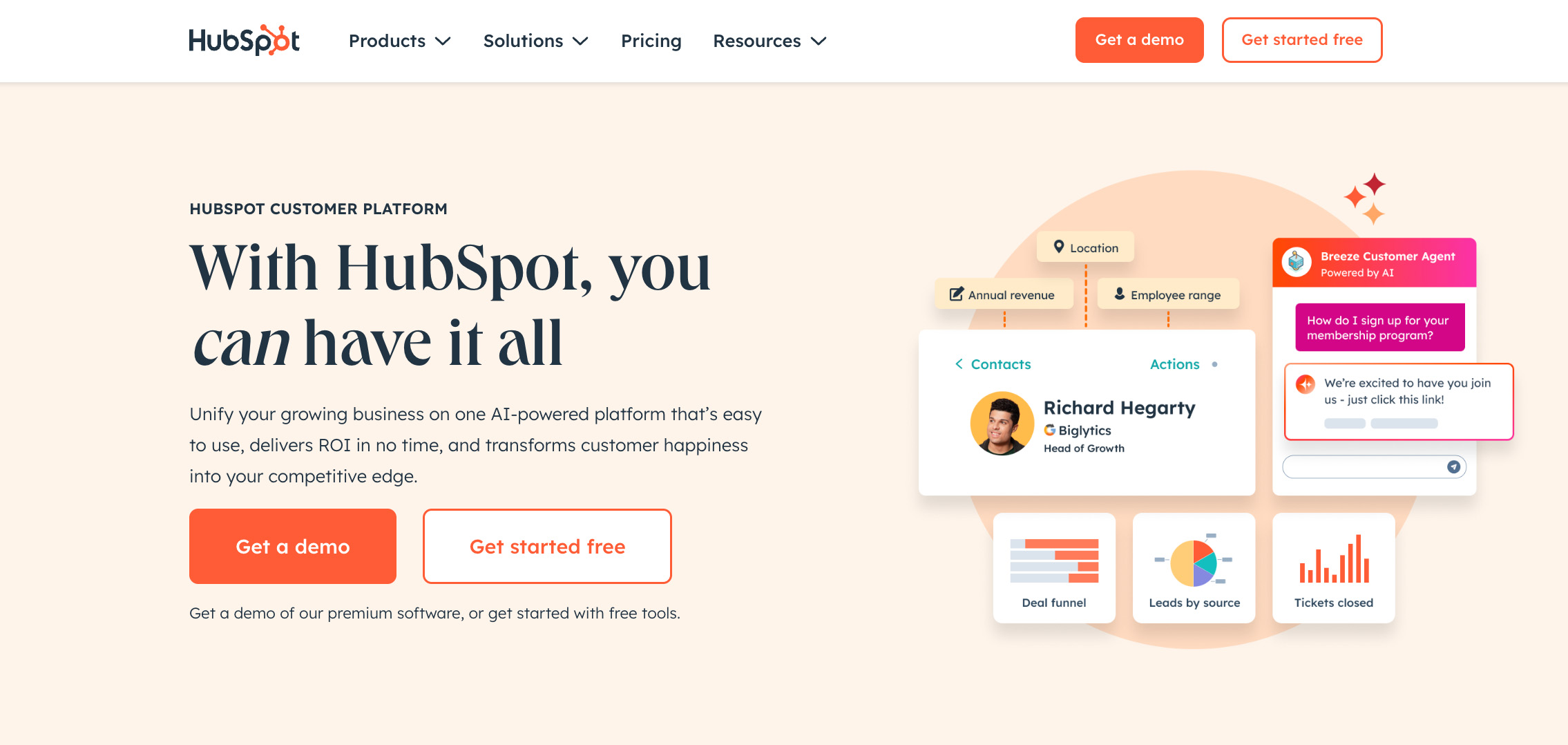
HubSpot’s free CRM is a strong option for startups. But as your team grows, so will your needs—and you may find they are more aligned with a different CRM.
Here are common reasons why businesses are making the switch.
Rapid cost escalation 💸
HubSpot’s free plan works well when you’ve only got two users. Once your business grows, expanding beyond that gets expensive, fast. Most growing teams move into the Customer Platform, HubSpot’s all-in-one bundle that combines marketing, sales, service, and other ‘Hubs’ on top of its Smart CRM.
- Starter: Priced per seat at $9 to $15 per user/month, depending on billing and promotional packages. Every time you need to add another user, the cost rises directly with team size.
- Professional: Comes with six seats included and starts at $1,300 per month. Each additional seat (team member) starts at $45/month.
- Enterprise: $4,700 per month and includes eight seats. Adding a new team member is $75 per seat.
Buying individual hubs rather than using the full Customer Platform bundle is possible. However, the cost of these add-ons can add up fast. For many businesses, what begins as an affordable solution can quickly turn into a steep monthly expense as their team and software requirements grow.
Learning curve for small teams 🧠
An extensive set of CRM tools sounds ideal on paper, but if you are someone who prioritizes accessibility and the essentials, it can be more than you need. This is what it might feel like using HubSpot. Some new users face a steeper learning curve, spending too much time figuring out the system.
Need robust financial and accounting integration 🔗
The accounting tools you use might also not sync as intended. For instance, the QuickBooks integration is designed to sync invoices from HubSpot to QuickBooks—not the other way around. This means the sync will fail if a user tries to edit the HubSpot-created invoice in QuickBooks.
Desire for targeted tools 🎯
HubSpot covers the basics of email marketing and CRM, but its e-commerce functions are still limited. Advanced needs, such as sales tax by jurisdiction or detailed segmentation with AI, either aren’t available or come with extra costs. Companies looking for specialized tools may find HubSpot’s offerings too general.
HubSpot is for businesses with dedicated teams who can invest the time to master its wide feature set. But if you’re looking for CRM software with tighter integrations, simpler pricing, or tools that fit small businesses without the heavy overhead, it may not be the right match.
HubSpot alternatives at a glance
Not all teams need the same kind of CRM. Some want a platform for everything, others need a sales-focused tool, while bigger organizations may demand enterprise power.
With that, we broke down the HubSpot alternatives into categories.
All‑in‑one CRM suites
These combine sales, marketing, and customer support in one package. They’re built for small and medium-sized businesses that want a CRM solution that can handle tasks like project management, lead generation, and forecasting in one login instead of handling multiple apps.
These all-in-one CRM platforms stand out:
- Method CRM: Offers an instant, two-way sync with QuickBooks, giving accounting professionals and service teams a true all-in-one system.
- Zoho CRM: Has a huge set of CRM features from email marketing to social media and automation features, all working within the Zoho app ecosystem.
- EngageBay: Affordable bundle with email templates, lead scoring, and workflows.
- Freshsales: Pairs sales pipeline management with built-in marketing automation tools.
Sales-first platforms
These prioritize pipeline visibility and closing deals. They’re perfect for lean sales teams that want to streamline follow-ups, reduce admin work, and keep their sales pipeline moving.
Here are some trusted sales-first CRMs:
- Pipedrive: Visual drag-and-drop sales pipeline with workflow automation.
- Copper: Known for deep Gmail and Google Workspace integration for contact management and task management right inside your inbox.
Enterprise-grade
These CRMs are made for large businesses that require complex setups, APIs, and advanced custom reporting. These scalable platforms often come with elevated pricing and longer onboarding, but they deliver the scale and control enterprises need.
These are the go-to enterprise-level CRMs:
- Dynamics 365: Unmatched Microsoft ecosystem tie-in, from project management to customer data optimization.
- Salesforce: The benchmark for enterprise CRM platforms, with vast customization options and add-ons for complex operations.
AI-powered support/e-commerce specialists
These CRMs zero in on automation, segmentation, and customer journeys rather than trying to cover every function. They’re built for online stores and digital-first businesses. With AI features layered in, they can handle tasks like automated follow-ups and customer support routing.
Here are some AI-powered tools that can handle e-commerce work:
- eesel AI: Brings AI-driven support and knowledge management. These help teams respond faster with contextual answers.
- Omnisend: An e-commerce marketing platform with email, SMS, and automation for smarter campaigns.
Open-source
For teams that want control, flexibility, and no recurring subscription fees, open-source CRMs let you host and customize the system yourself. They’re ideal if you have in-house developers or IT support, since you can tailor features, integrations, and data security to your exact requirements.
Here’s a popular open-source CRM:
- SuiteCRM: A widely used open-source CRM that’s a fork of the open-source SugarCRM Community Edition. This means that it came from SugarCRM’s open-source code. It covers sales, service, and marketing, with full access to the codebase for custom development.
In-depth HubSpot alternative reviews
We’ve outlined the main categories of CRMs, but picking the right fit comes down to the details.
Here’s a deep dive into the best HubSpot alternatives, what they do well and who they’re best suited for.
1. Method CRM
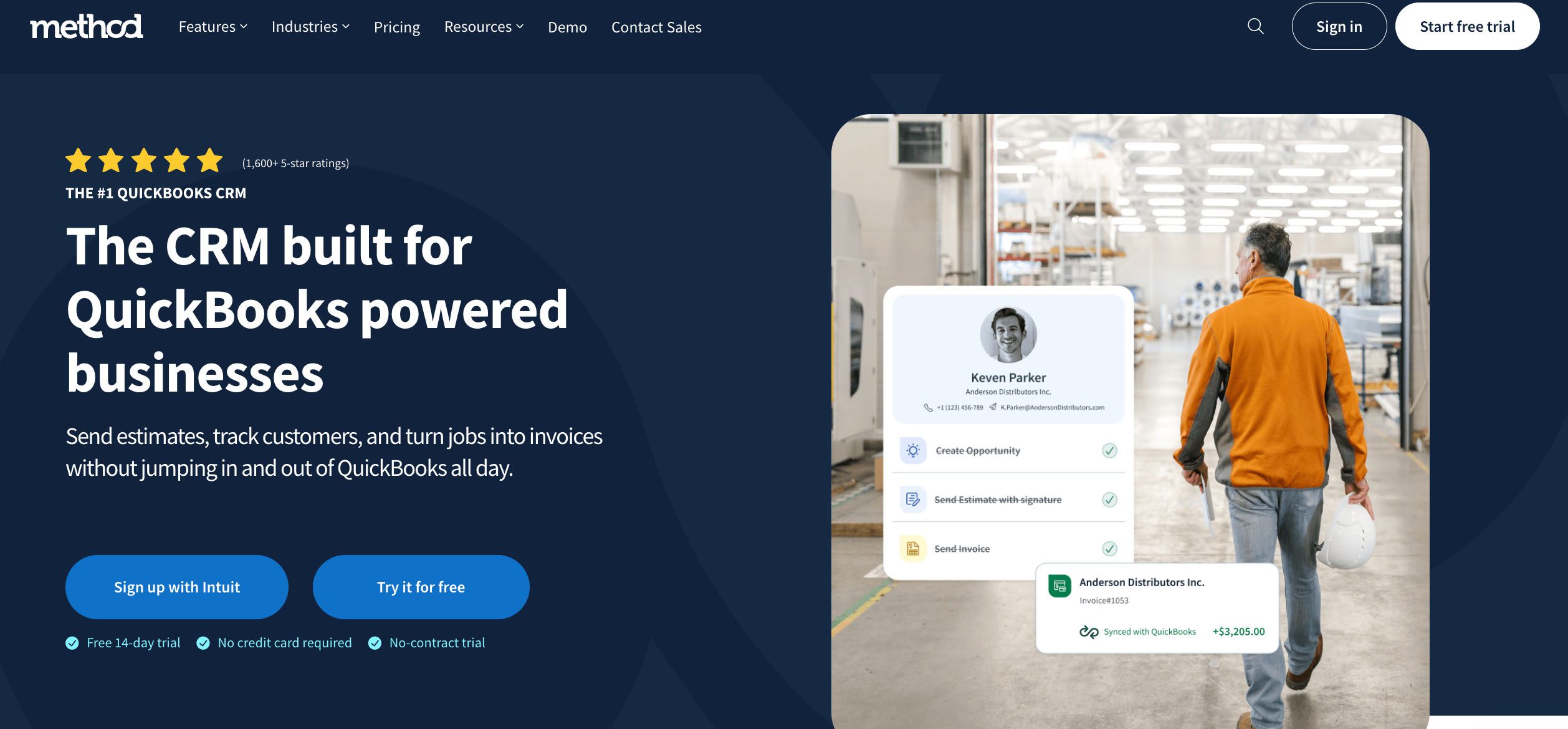
💰 Pricing: Free 14-day trial (includes a setup demo and an hour of customization); Contact Management plan at $27/user/month, CRM Pro at $45, Enterprise at $73. Custom pricing available for CRM Multi-entity.
Method CRM is a no-code, fully customizable platform built for businesses that use QuickBooks. Its two-way, real-time sync with QuickBooks Online and Desktop eliminates duplicate data entry and keeps accounting records accurate. Users can capture leads, create estimates or invoices, manage follow-ups, and even provide customer portals for payments and support, all within the same system.
Method also connects seamlessly with a wide range of apps, including emails from Gmail and Outlook, calendar apps such as Google Calendar, marketing tools like Mailchimp, forms via Jotform, and Zapier for expanding beyond the core CRM.
Combined with automation features and dedicated onboarding support, Method is best suited for companies that want full control of their CRM while staying tightly connected to their accounting system.
SUCCESS STORY: How one shipping container company doubled their revenue over three years with Method CRM.
2. Zoho CRM

💰 Pricing: Free plan available; Standard at $14/user/month, Professional at $23, Enterprise at $40, and Ultimate at $52 (billed annually).
If you’re already part of the Zoho app ecosystem, Zoho CRM is for you. The system connects seamlessly with other Zoho apps, such as Campaigns, Books, and Desk, creating a more unified system that ties together CRM, accounting, and support.
Its free plan covers core functions like contact and deal management, task tracking, and email management. Paid plans expand capabilities with workflow automation, advanced analytics, sales forecasting, and insights through its AI-powered assistant, “Zia.”
See how Method vs Zoho CRM stacks up.
3. Pipedrive

💰 Pricing: The Lite plan starts at $14/seat/month, Growth at $24, Premium at $49, and Ultimate at $69 (billed annually). Free 14-day trial.
Pipedrive’s strength is its visual pipeline. Deals move through drag-and-drop stages, and custom fields make it easy to adapt the system to your sales process. The built-in sales assistant offers deal reminders, follow-ups, and workflow tips to reduce repetitive tasks.
With over 400 third-party integrations and practical automation capabilities, Pipedrive works well for smaller teams that want a focused, sales-focused CRM system that can adjust to their existing processes, but without the extra layers of a full marketing automation platform.
Not sold on Pipedrive? Discover the best Pipedrive alternatives for small businesses.
4. ActiveCampaign
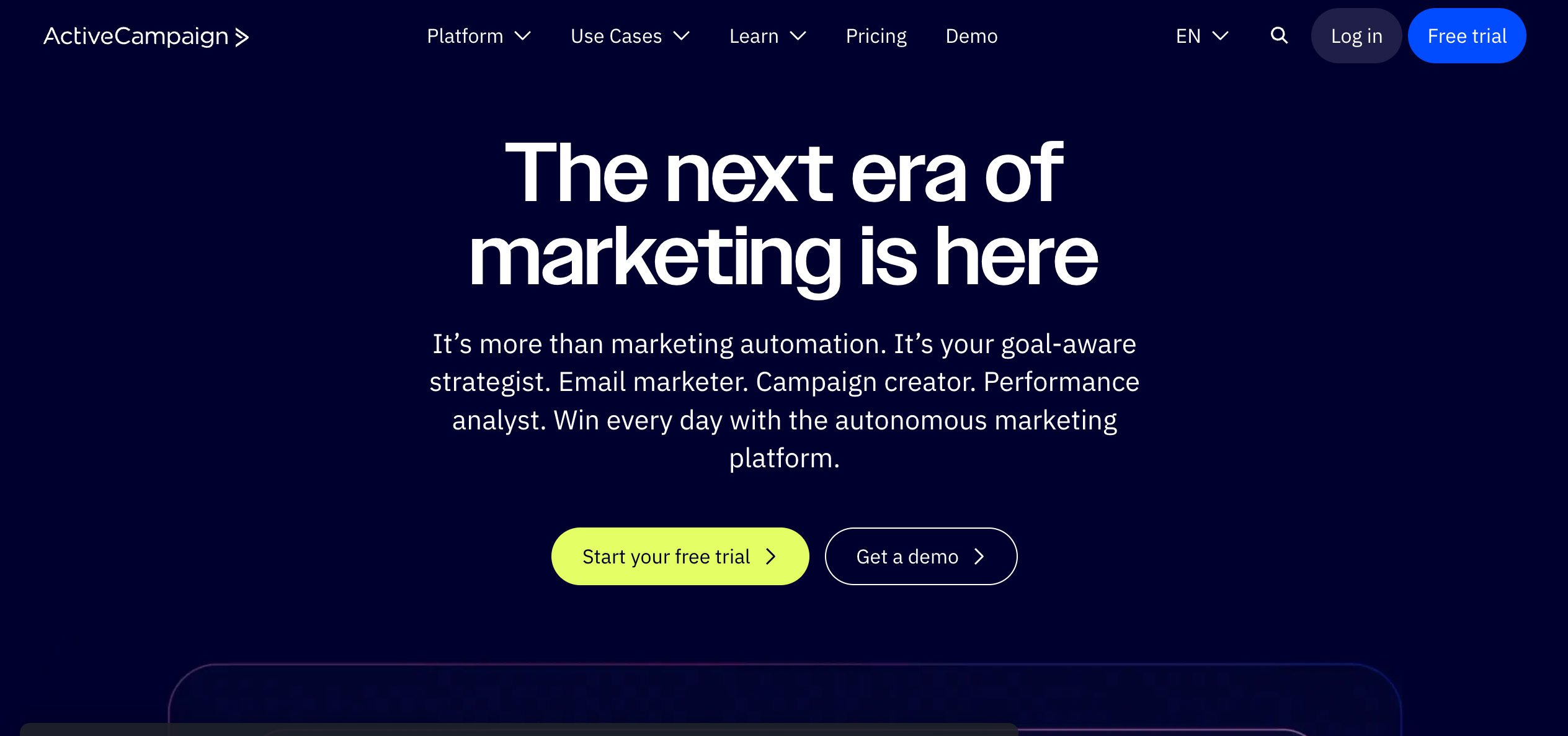
💰 Pricing: Depends on the number of email contacts. Starter plan starts at $15/user/month, Plus at $49, Pro at $79, and Enterprise at $145 (based on 1,000 contacts). Free 14-day trial.
Looking for a marketing automation platform that handles smart segmentation, nurturing sequences, and campaign logic without needing separate tools? ActiveCampaign delivers. Alongside its CRM system, ActiveCampaign offers email automation, predictive content, split testing, conditional content, and landing page creation.
ActiveCampaign’s automation-first approach makes it a top pick for campaign logic, metrics, and personalized outreach. Build robust marketing campaigns and multi-channel automations, plus tap into prebuilt templates to get started right away.
5. Freshsales

💰 Pricing: Free plan available; Growth at $9/user/month, Pro at $39, Enterprise at $59.
Ideal for teams looking for an integrated solution, Freshsales by Freshworks combines multi-channel communication tools and automation capabilities to support efficient sales workflows. The Freddy AI engine enables sales teams to prioritize high-value prospects effectively through smart insights.
Its scalability ensures that as businesses grow, the platform can adapt to more complex sales processes. A free plan with basic CRM functionality and a limited number of user seats is also available to get you started.
Check out this detailed comparison of Freshsales vs Method CRM.
6. EngageBay
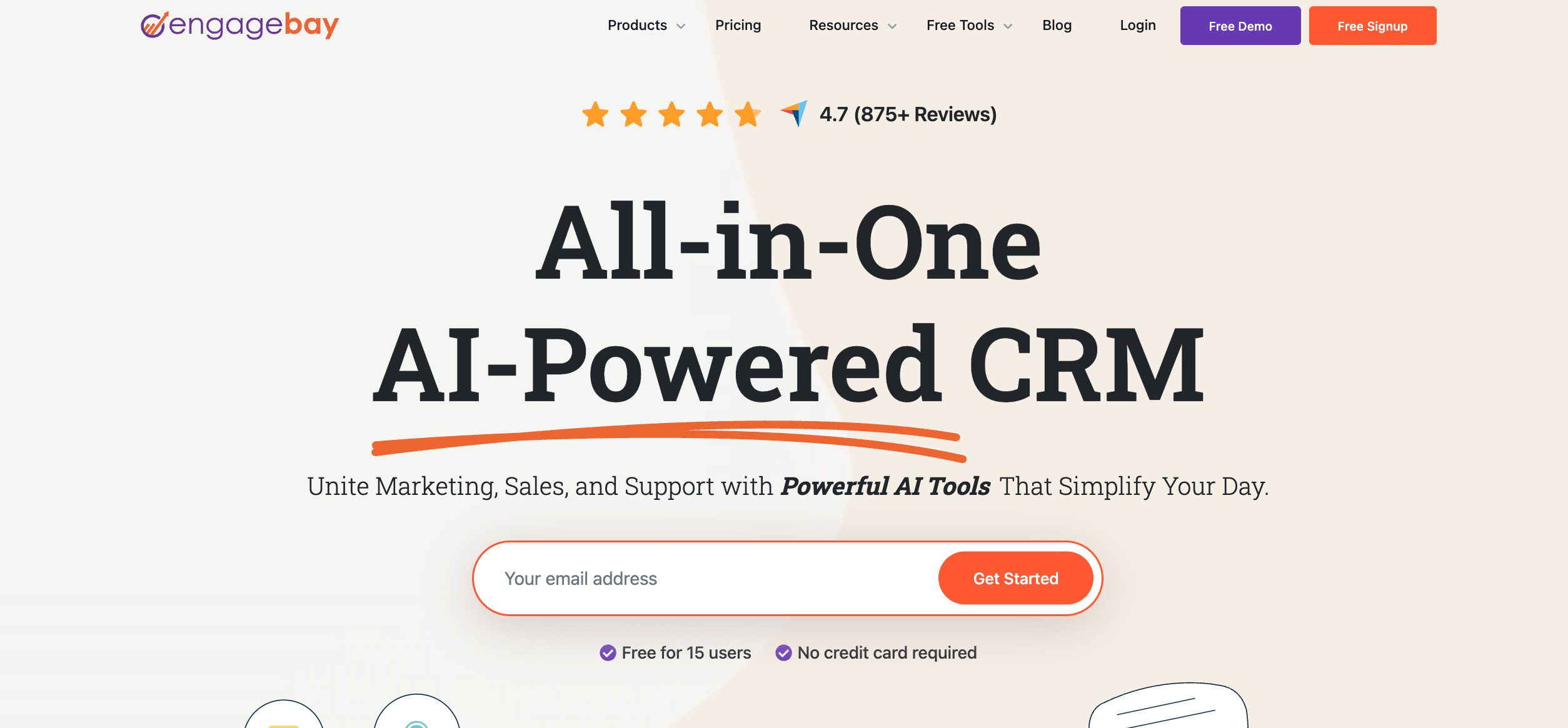
💰 Pricing: Free plan available; Basic at $13.79/user/month, Growth at $59.79/user/month, and Pro at $110.39 (billed annually).
EngageBay is an all-in-one CRM with marketing automation, sales, and service tools in a single platform. It’s recommended as one of the most affordable CRMs for value, providing AI-powered tools and omnichannel engagement that’s accessible from a single dashboard.
The platform also includes support tools such as a helpdesk and live chat, giving businesses a unified way to manage customer interactions. Built-in features like email campaigns, landing pages, and automation workflows allow teams to engage leads and nurture relationships efficiently.
7. Omnisend

💰 Pricing: Free plan available; Paid plans cost depends on the contact list size. Standard at $16/month for up to 500 contacts, Pro at $59/month for 2,500 contacts. Custom plans available upon inquiry.
Omnisend is built for e-commerce businesses. It’s mainly a marketing automation platform, which also features a CRM system that captures, organizes, and uses your customer data to drive smarter decisions.
Integrations with Shopify, WooCommerce, and BigCommerce sync customer data for precise, personalized campaigns. With its intuitive interface and ready-to-use templates, Omnisend suits businesses looking to manage their multi-channel marketing efforts.
8. eesel AI
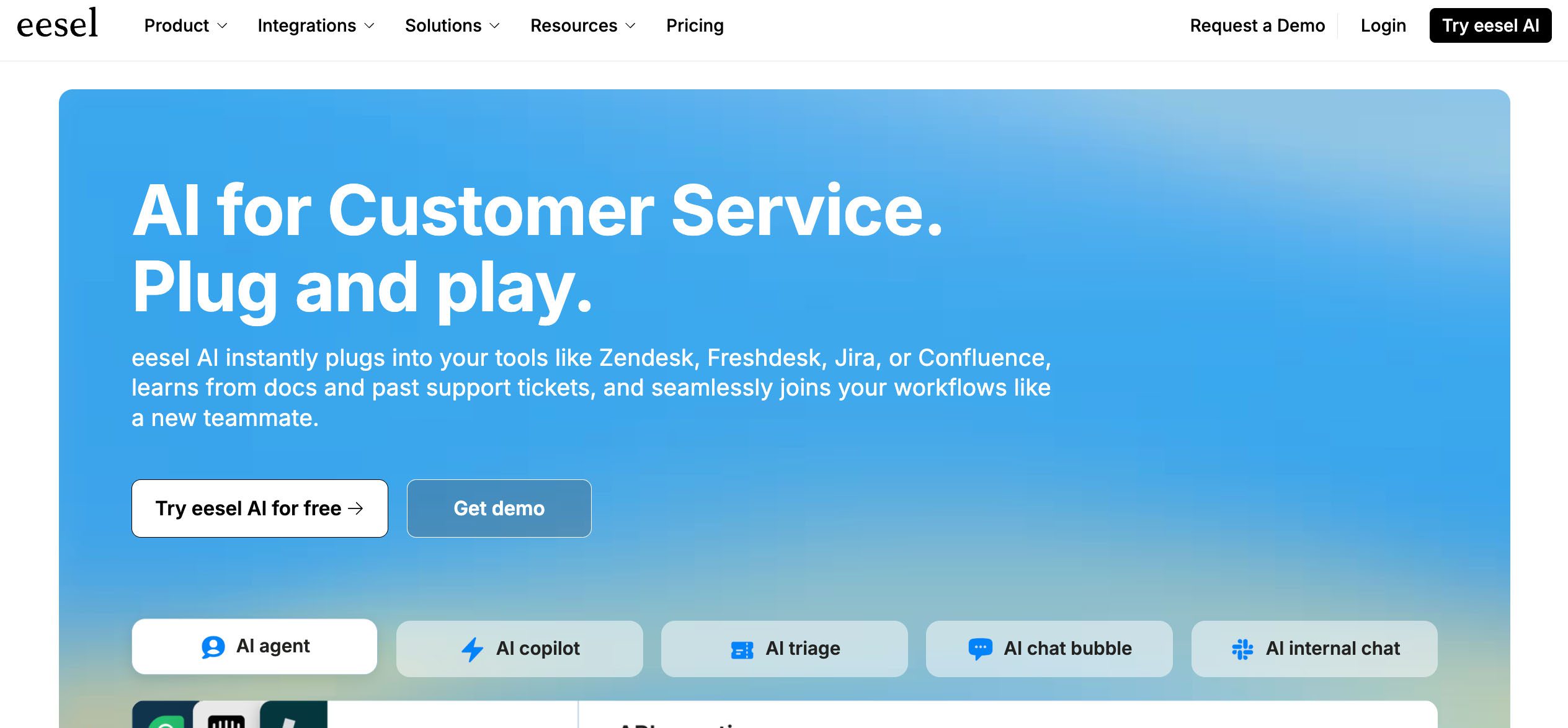
💰 Pricing: Free 7-day trial; Team plan at $239/month (three bots and up to 1,000 interactions/month), and Business at $639/month (unlimited bots and up to 3,000 interactions/month). Custom pricing available.
Eesel is an AI-driven platform that combines conversational AI with a smart search engine, integrating with CRM systems (like Zendesk and Freshdesk) to automate customer interactions and improve internal knowledge management. It acts more like a virtual assistant for sales and support teams, using chatbots and AI tools to handle queries and simplify workflows across connected apps.
The AI’s adaptability allows it to function across multiple support channels for a consistent customer experience regardless of the platform used.
9. Salesforce

💰 Pricing: Free plan available; Starter Suite at $25/user/month, and Pro Suite at $100/user/month.
Need a CRM that can handle your most complex business processes? Salesforce is built for exactly that. Its workflow builder lets teams automate multi-step processes, from approvals to opportunity management, without extensive coding. The platform also integrates deeply with other systems and offers a wide range of add-ons to support marketing, sales, and service operations.
While powerful, Salesforce requires investment in setup and training. This makes it suited for organizations with the resources to fully take advantage of its capabilities.
See our in-depth Method vs Salesforce CRM comparison.
10. Microsoft Dynamics 365
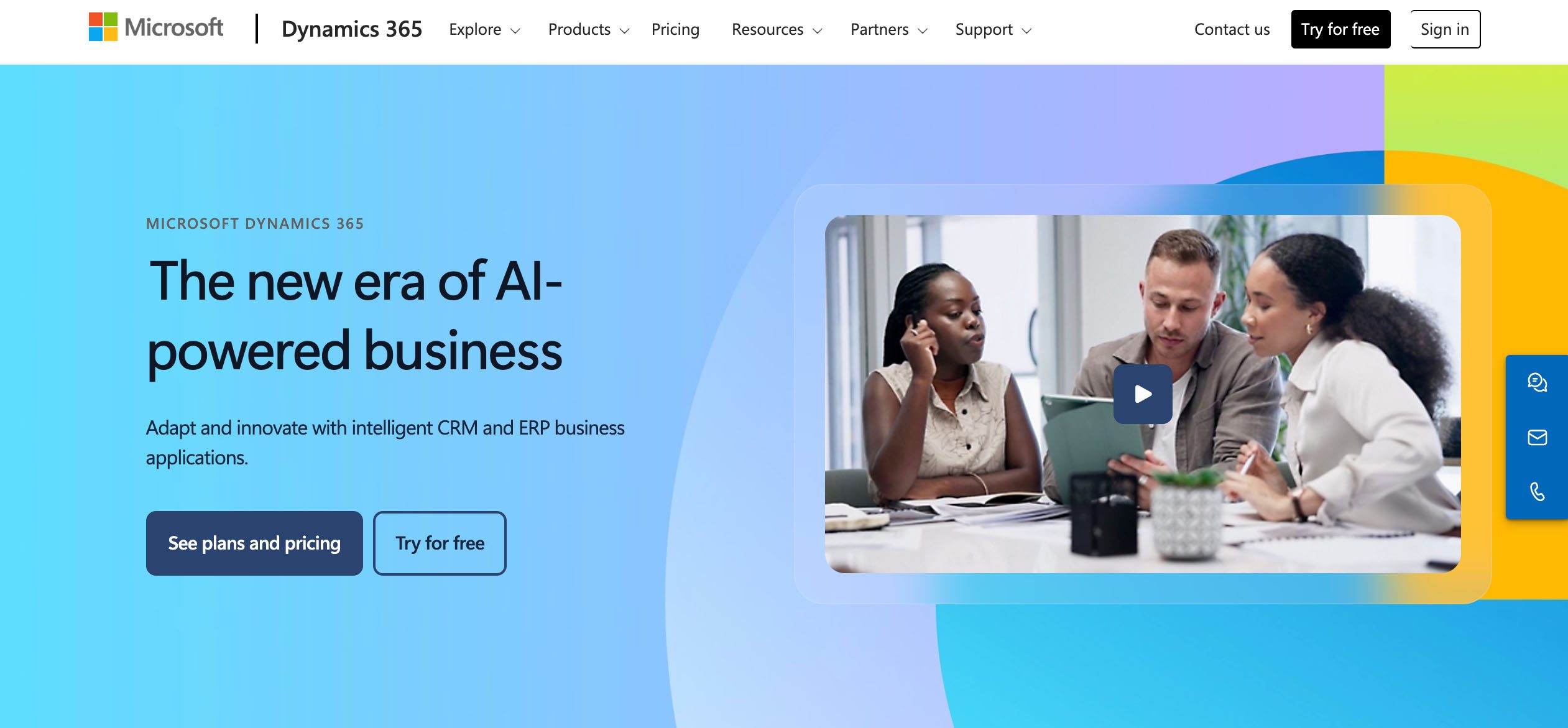
💰 Pricing: Plans start at $65/user/month for the Sales Professional License, $105 for a Sales Enterprise License, $150 for a Sales Premium License, with additional costs for add-ons like Copilot and Customer Insights. Free 30-day trial.
Microsoft Dynamics 365 combines AI-powered CRM and ERP tools to keep sales, marketing, and customer service running smoothly. The standout is its native integration with Microsoft 365 apps (Outlook, Excel, Forms, Teams, etc.).
This tool excels in automation, advanced reporting, and analytics, helping teams streamline workflows and generate actionable insights with the power of AI. Just be aware that these functionalities have a steep learning curve and come with higher implementation costs.
11. SuiteCRM
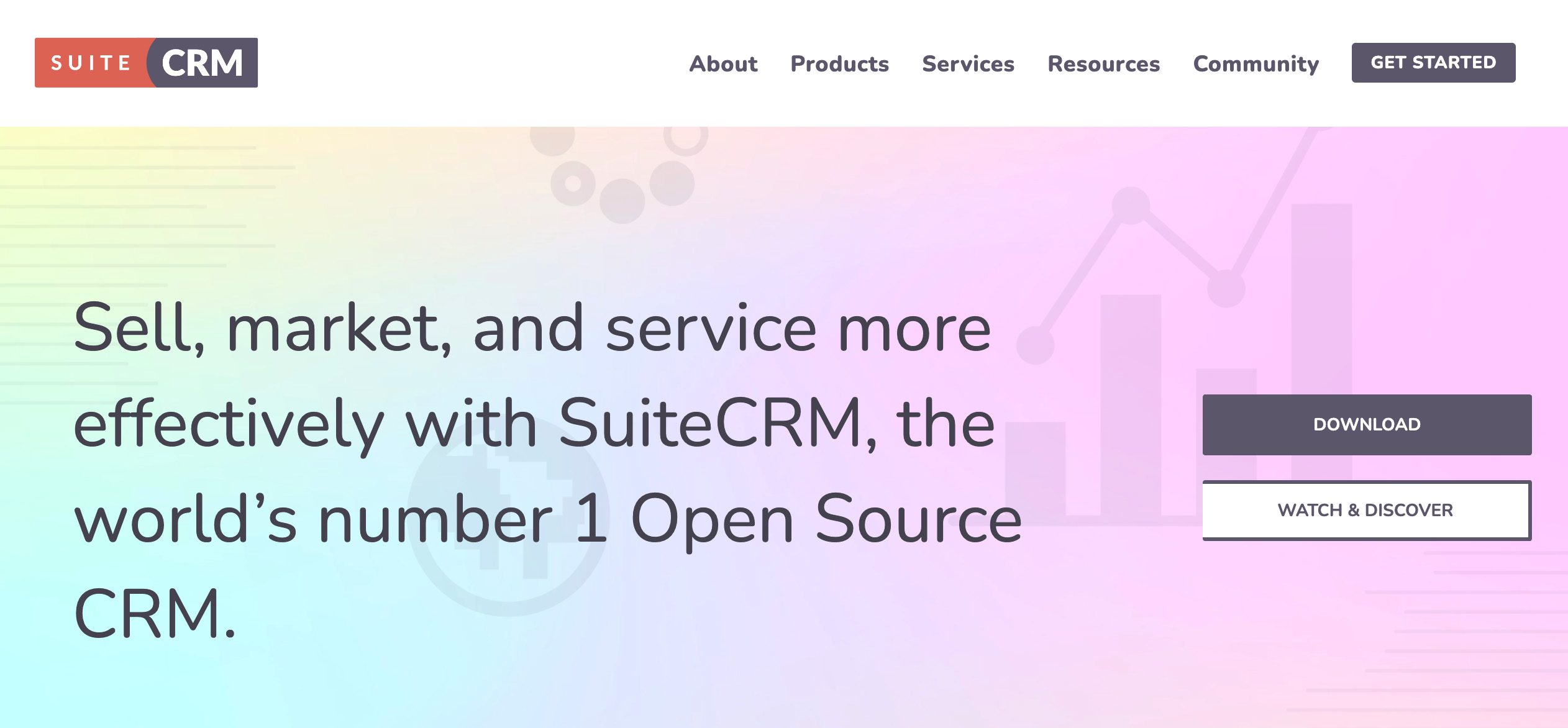
💰 Pricing: Open-source and free for unlimited users who choose to self-host the CRM; UK-only managed hosting plans start at ~$180/month (£130) for up to 10 users on shared infrastructure. A dedicated instance starts at ~$4300/year (£3200), hosted in the U.S. or the UK.
SuiteCRM is an open-source CRM. This means that its source code is available for businesses to modify and adapt. As mentioned, it’s built on SugarCRM’s Community Edition. The SuiteCRM team then added new key features, fixed issues, and tailored the platform for a broader audience, creating a fully independent CRM while retaining its SugarCRM roots.
It’s completely free when self-hosted, and for those requiring additional support, SuiteCRM offers hosted plans with varying levels of service.
12. Copper CRM
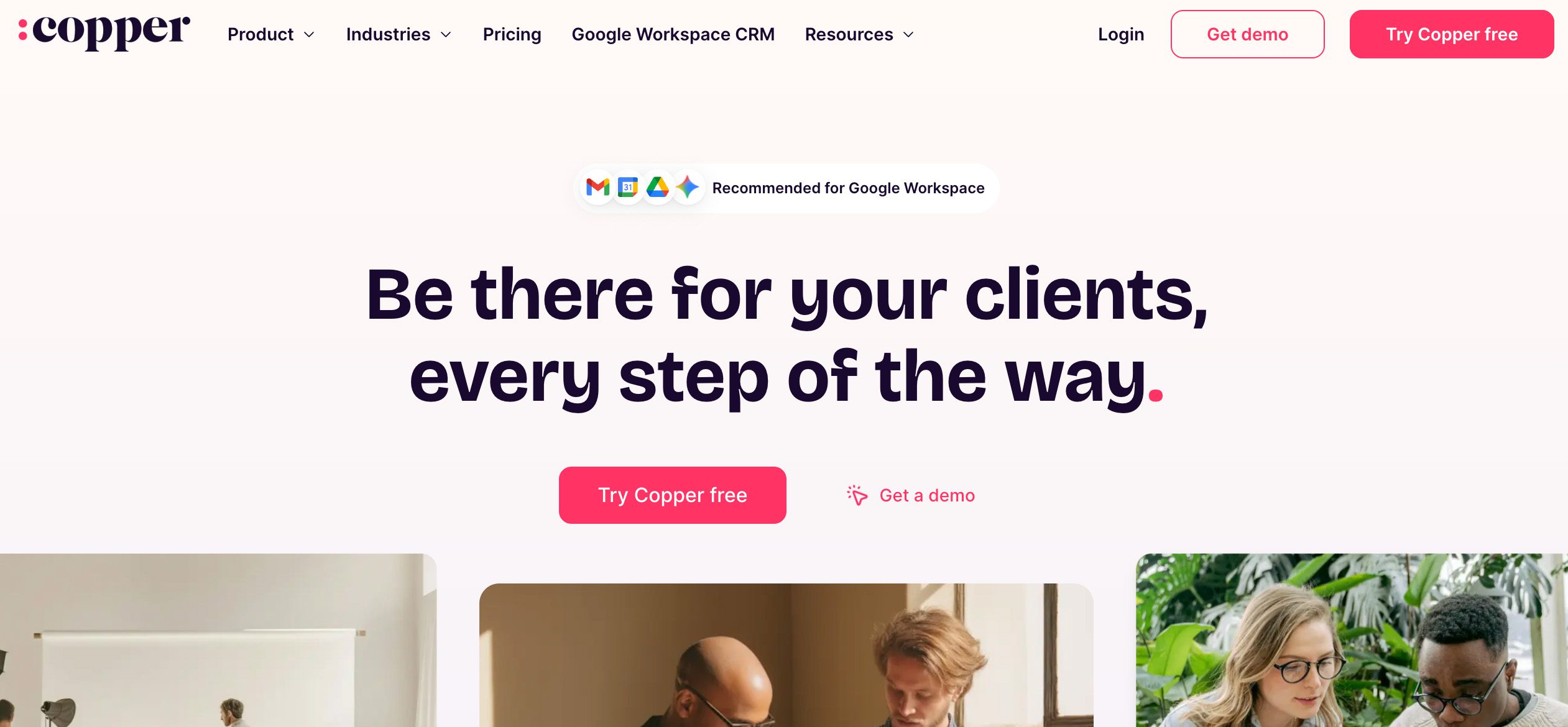
💰 Pricing: Starter at $9/user/month, Basic at $23, Professional at $59, and Business at $99 (billed annually). Free 14-day trial.
Copper CRM is a cloud-based CRM platform designed to work natively within Google Workspace. Unlike traditional CRMs that require manual data entry, Copper automatically syncs within the Google ecosystem.
For instance, this means that teams can create and use email templates right in Gmail, which keeps your messaging consistent, speeds up follow-ups, and saves time on every send. Having deep integration with Google Workspace enhances workflow efficiency while maintaining a centralized view of customer data.
Looking for a similar fit? Check out our Copper CRM alternative guide.
How to choose the right HubSpot alternative
Picking the right HubSpot alternative comes down to knowing what your business really needs. With so many CRM alternatives on the market, being clear about your priorities helps you choose one that actually works for your team.
Here’s what to consider when choosing a HubSpot alternative.
Define your top priority 🥇
Do you want a CRM that gives the most bang for your buck or one that delivers all the bells and whistles?
Identify which factor matters most before evaluating your options:
- Cost savings: Platforms that deliver essential CRM functionality and automation at a lower price. This is ideal for startups and small teams who aren’t keen on HubSpot’s escalating fees.
- One-purpose expertise: Solutions focused on a specific function, like sales pipelines or marketing automation, often outperform generalist CRMs in that area.
- Accounting sync: CRMs with native integration to QuickBooks, Xero, or similar tools prevent duplicate data entry and maintain accurate financial records.
Assess team size, technical resources, and budget 📋
Some assessment tips to keep in mind:
- Figure out how many people will use the CRM and what access they need.
- Decide if your team can handle setup and support, or if you’ll need the vendor’s help.
- Plan your budget to cover the subscription, add-ons, and any extra support.
Larger teams can handle more complex systems with advanced customization, while smaller teams benefit from a user-friendly interface.
Implement a trial and migration strategy 💡
A trial and migrate strategy lets you test the CRM on a smaller scale first before committing company-wide. Start with one team or department and move only a sample of data. This way, you can assess real-world functionality.
Use the platform’s native integrations and import tools to avoid unnecessary manual setup. This approach reduces risk and identifies potential workflow friction before a full rollout.
Pro tip! Always document what worked and what didn’t. Having a record makes it easier and quicker to roll out migration across the rest of the business.
Prioritize tools that match workflows without excessive bloat ⚙️
Choose a CRM that aligns with your workflow. Overloaded platforms can slow adoption and create unnecessary complexity.
For example, if you’re an e-commerce business that needs order tracking, email campaigns, and abandoned cart automation, narrow down your options to CRMs that include these features first. The bonus add-ons come later.
Where Method CRM fits
Tracking leads and managing billing in QuickBooks can be frustrating without the right integration. HubSpot sometimes struggles here, with accounting integrations that don’t sync as smoothly as some users expect. Method CRM, however, is built specifically for finance-driven workflows, making it a better fit for teams that rely on QuickBooks.
Here’s why Method works so well for businesses.
Dual sync with QuickBooks 🔄
Method offers a best-in-class, two-way sync with QuickBooks Online and Desktop. Customer data, estimates, payments, and invoices update automatically and in real-time across these platforms.
Because keeping sales and accounting aligned is essential for almost every business, this level of sync eliminates two of the biggest sources of inefficiency: duplicate entry and missed updates.
Accounting-aware CRM with multi-entity support and automation 🦾
For businesses that manage multiple locations or subsidiaries, Method keeps records separate while allowing shared oversight. Its accounting-aware structure connects sales activity directly to financial data.
Add in workflow automation, like auto-creating follow-up reminders or generating an invoice once a deal closes, and teams save hours each week.
Competitive pricing and smoother onboarding 🤝
You can access many of Method’s extensive feature set at its base plan costing $27/user/month, which is far lower than HubSpot’s Professional Customer Platform for $1,300/month. Method keeps pricing straightforward and scalable for mid-sized companies.
Onboarding is easier, too, since staff familiar with QuickBooks or Xero can work within a system that already feels familiar. On top of that, you get a customer success manager, help center resources, and support with data import to keep everything mapped correctly.
HubSpot alternatives: Summary table
After breaking down each platform in detail, here’s an overview to help you compare.
| CRM tool 🛠️ | Best for 👍 | Highlights 🌟 |
| Method CRM | QuickBooks/Xero integration | Dual sync with QuickBooks and Xero, deep customization, and workflow automation for CRM and accounting. |
| Zoho CRM | Zoho app ecosystem | Feature-rich CRM with strong automation, AI insights, and seamless Zoho app integrations. |
| Pipedrive | Sales pipeline | Visual, drag-and-drop pipeline management with reminders, automations, and 400+ integrations. |
| ActiveCampaign | Marketing automation | Advanced email automation, campaign logic, landing pages, and robust segmentation tools. |
| Freshsales | Affordable, AI-powered CRM | AI-powered lead scoring, built-in telephony, multi-channel communication, and strong scalability. |
| EngageBay | Entry-level friendly CRM | Affordable CRM with sales, marketing, and service tools in one unified platform. |
| Omnisend | E-commerce | Designed for online stores with Shopify, WooCommerce, and BigCommerce sync plus multi-channel campaigns. |
| eesel AI | AI-driven support | An AI layer that automates support workflows and integrates with CRM systems. |
| Salesforce | Enterprise | Enterprise-grade power with a workflow builder, ecosystem add-ons, and deep integrations. |
| Microsoft Dynamics 365 | Microsoft app ecosystem | Combines CRM and ERP with AI insights, advanced reporting, and native Microsoft 365 integration. |
| SuiteCRM | Open-source | Free, self-hosted CRM with full customization and optional hosted support. |
| Copper CRM | Google Workspace integration | Native Gmail/Google Workspace CRM with automated syncing and built-in email templates. |
Frequently asked questions
Is HubSpot CRM free?
Yes, HubSpot offers a generous free plan that includes contact management, email marketing, forms, and basic dashboards. However, the free version has limits on automation, reporting, and team collaboration.
As your business grows, advanced features like workflow automation, custom reporting, and higher email sends require upgrading. These paid tiers can become expensive quickly, especially if you need multiple add-ons.
Do CRM costs increase over time?
Yes, CRM costs do increase over time. For instance, HubSpot starts free, but once you move up, the pricing rises across its “Hubs” (sales, marketing, service, CMS, and operations), each with its own set of add-on tools.
This is why many businesses outgrow the free stage and face steep increases as they expand. It’s important to project future costs, not just look at the entry-level price.
What is the best alternative to HubSpot?
The “best” alternative depends on your priorities. Zoho CRM stands out for its affordability and app ecosystem. Salesforce delivers enterprise-level power. If accounting sync is critical, Method CRM is a strong fit thanks to its two-way QuickBooks and Xero integration. For e-commerce, Omnisend excels with advanced marketing automation.
Finding the best alternative comes down to knowing which features will support your team’s day-to-day.
Final thoughts: Finding a HubSpot alternative that fits your business
The right CRM isn’t about choosing the platform with the longest feature list. Focus more on finding the one that matches your budget, team, and workflow.
HubSpot offers a powerful suite, but its pricing structure and focus on being a “jack of all trades” may lead many businesses to look elsewhere.
Here’s a quick recap of what to look for in a HubSpot alternative:
- Pricing transparency: Project costs as your contacts, users, and tools scale.
- Core priorities: Decide if you need affordability, accounting sync, advanced automation, or industry-specific workflows.
- Ease of use: Match the platform to your team’s technical skills and capacity.
- Scalability: Confirm the CRM can grow with you without forcing expensive jumps.
- Integrations: Check how it connects with tools you already rely on.
Choosing a CRM requires you to balance cost, complexity, and capability against your business needs. Method CRM checks all those boxes.
Method delivers accounting-aware CRM functionality, two-way QuickBooks and Xero sync, flexible automation, and competitive pricing. This makes it a solid choice for growing businesses that want more control without HubSpot’s escalating costs.
Experience Method in action — schedule your free demo today.






